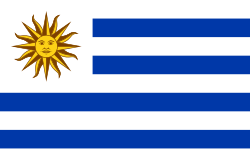Uruguay
The Oriental Republic of Uruguay (note that in this case "oriental" means "eastern" and refers to the country's position east of the Uruguay River and nothing to do with the Orient)[note 1] is a country situated on the east coast of South America, sandwiched between Brazil and Argentina. The capital is Montevideo, which is ironic in being the deathplace of the Monteradio star named after the video, before the video was invented.
They play a bit of footie and have won the World Cup twice, but apart from the German cruiser Admiral Graf Spee being scuttled in the River Plate, which must have really annoyed the harbour master, nothing much exciting happens there.
They've even managed to avoid having an interesting tyrant such as Augusto Pinochet, or Alfredo Stroessner, and have never invaded the Falkland Islands, though during the military dictatorship (1973–1985) Uruguay had the world's highest number of political prisoners per capita.[1]
Hell, their prócer (which roughly means Founding Father), José Artigas, was notorious for fighting to free the slaves in the territory and being raised with the local indigenous population, despite being relatively wealthy and going into the military. Too bad some asshole![]() came over and genocided them.[2]
came over and genocided them.[2]
They did have a Socialist President named José Mujica from 2010–2015, but he was elected, pro-Israel, and didn't trash-talk the US as much as Hugo Chávez. He was, in fact, pretty awesome, donating 90% of his salary to charity, legalising weed and allowing abortion to be legalised.[3]
Uruguay is one of the smallest countries in South America in terms of size and population. Since 1985, the Uruguayan population has stagnated at around 3 million, due to low birth rates and emigration. Today, the country has only 3.4 million inhabitants (for comparison, the US state of Connecticut has 3.6 million inhabitants).[4]
Social policies[edit]
Uruguay is widely considered to be the most secular country in Latin America. Church and state are strictly separate and 15 to 40 per cent of the population is non-religious, depending on which source you prefer. As a result, Uruguay's social policies are somewhat more liberal than the rest of the continent.
- In 2008, Uruguay was the first Latin American country to introduce civil unions for same-sex couples. Full marriage equality was achieved five years later.
- In 2012 abortion was de-criminalized and the death rate from abortions dropped to zero. This made Uruguay the second country in South America to have legalized abortion (the first country being Guyana).
- In 2013 Uruguay passed a law allowing growth, possession and buying of cannabis, becoming the first country to fully legalize the sale and growing of marijuana.
So, hey, a nice place to be young and chill. Uruguayans even have their own Las Vegas![]() on the coast with the Atlantic Ocean and the Rio de la Plata.
on the coast with the Atlantic Ocean and the Rio de la Plata.
The old parts of Uruguay[edit]
Uruguay had a rocky history, fighting off the Spanish, the Portuguese, and the English. They won most of those wars by being a tiny front with only grasslands to offer.
While the rest of the world was off fighting on wars, Uruguay had both a populist president![]() and a niche market, selling meat to the Allies. This was a prosperous time, with Uruguay being called "the Switzerland of America". Nobody really cared that much.
and a niche market, selling meat to the Allies. This was a prosperous time, with Uruguay being called "the Switzerland of America". Nobody really cared that much.
Where things got really violent[edit]
However, things got extremely exciting, perhaps too much, on the 70's. A new president, Jorge Pacheco Areco, was sworn in after the old one died in office. Areco banned the Socialist Party of Uruguay, as well as other leftist organizations, a bunch of newspapers, and much more. He did this because he was fighting an urban guerilla, the Tupamaros. These guys were rough, killing a US security expert and kidnapping the English ambassador. In response, Areco cracked down on them. By 1972, the Tupamaros were all but dismantled. In 1971, a new president took office, Jorge María Bordaberry. Bordaberry continued Areco's repressive policies, and, being pressured by military juntas, gave in and dissolved Parliament, giving control to the military. Most of this had the CIA turning a blind eye and, more actively, training the military. That security expert the Tupamaros killed was there for that purpose. After all, we can't have communism under any circumstances, right?
The military then started a bloody dictatorship, killing, torturing and disappearing hundreds of people. About 180 people were disappeared. To this day, most of their remains were not found.
Where democracy returns[edit]
However, democracy did return. More than half of Uruguayans voted nay in a referendum to legitimise the juntas. And what's more, the military actually thought they should hold a real referendum rather than falsifying the results. And after years of demonstrations against the regime and the Juntas, a new president was elected, Julio María Sanguinetti. He reformed away most of the damage. However, instead of going in against the military and officers, he gave them all amnesty for their human rights abuses. Whoops.
Not to be confused with[edit]
See also[edit]
Notes[edit]
- ↑ Whose name in turn referred to the fact that it was east of the Western world that came up with the term, AKA the Occident. Blame the fact that languages change over time.

